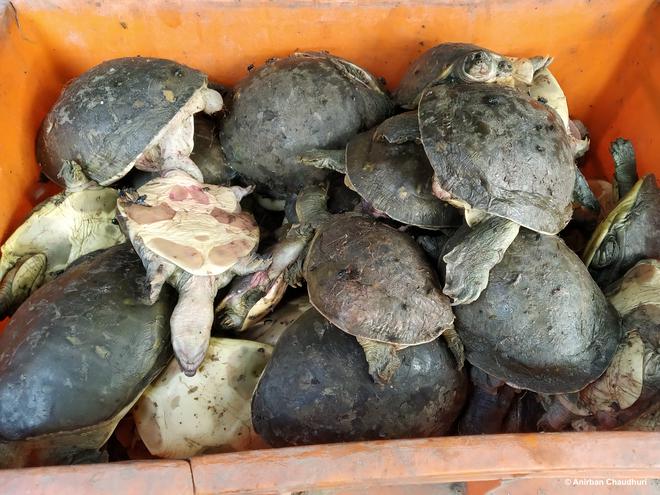Chennai is the highest-ranked node in the tortoise and hard-shell turtle trafficking network fuelling the global pet trade, a new study has found.
Mumbai, Kolkata, Bengaluru, Anantapur in Andhra Pradesh, Agra, and two districts of West Bengal — North 24 Parganas and Howrah — close to the India-Bangladesh border also rank high, the study published in the September edition of Oryx, The International Journal of Conservation, said.
The study titled From pets to plates also found that the trafficking of soft-shell turtles for meat was predominantly domestic in nature, with the international trafficking of the reptile from or to India almost restricted to Bangladesh.
The most frequent trafficking links in the soft-shell turtle trafficking network were from Jaunpur in Uttar Pradesh to unspecified districts in West Bengal and from North 24 Parganas to unspecified districts in Bangladesh, it said.
The authors of the study are Ramya Roopa Sengottuvel, Aristo Mendis, Nazneen Sultan, Shivira Shukla, Anirban Chaudhuri, and Uttara Mendiratta, all associated with the Counter Wildlife Trafficking Programme of the Wildlife Conservation Society-India.
Double whammy
‘Asian turtle crisis’ is a term often used to describe the current state of tortoises and freshwater turtles (TFTs) in the largest continent on earth. Wild populations of TFTs have suffered immensely due to the onslaught of habitat destruction and illegal and unsustainable harvest, the researchers said.
“The TFTs are under tremendous pressure from illegal trade, as pets, food, and medicines across the world. In India, at least 15 of the 30 TFT species, including those threatened by extinction, are illegally traded. Tens of thousands of TFTs are seized across India annually by law enforcement agencies,” their study said.

The study aimed at examining the similarities and differences in the operation of illegal trade in tortoises and freshwater turtles that are in demand for different illegal markets, towards designing targeted interventions.
“Countering the complex trade in TFTs has been a challenge. This study is part of our attempt to break up the larger problem of illegal trade in TFTs into smaller and more manageable units, based on demand and type of markets,” Ms. Mendiratta said.
Based on seizure reports
The researchers conducted a systematic online search for media reports on seizures of tortoises and freshwater turtles originating from India from January 1, 2013, to December 31, 2019.
From these reports, they reconstructed the illegal supply network for the two groups – tortoises and hard-shell turtles for illegal pet trade, and soft-shell turtles for meat trade – using 78 and 64 media-reported seizures respectively.
The identified nodes in the network represented districts (for locations within India) or cities (for locations outside India), and each link represented a trafficking connection between the nodes.
Transit or collection point
“Chennai was identified as the most central node in the tortoise/hard-shell turtle trafficking network… Kuala Lumpur (Malaysia), Bangkok (Thailand), and unspecified districts in Bangladesh were identified as the most important importing nodes,” the study said.
“Within India, Chennai and Mumbai had the highest numbers of incoming trafficking links in this network, indicating their role as transit or collection points for further export abroad,” it added.
The study found that the tortoise and hard-shell turtle network had a larger geographical scale with more international trafficking links than the soft-shell turtle network. They recorded complex routes in tortoise and hard-shell turtle smuggling, whereas the soft-shell turtle trafficking was one-directional from source to destination.
The authors explained that the results could indicate higher levels of organisation and complexity involved in the trafficking of tortoise and hard-shell turtles compared to soft-shell turtles.
Mr. Chaudhuri, an expert in reptile trade and rescue, and an author of the study, highlighted the effects of the trade. “The turtles that come in trade land up in very poor state. They are dehydrated and starved, and many come with broken or bruised shells, many times with irrecoverable external injuries. Mortality in these turtles is also high,” he said.







